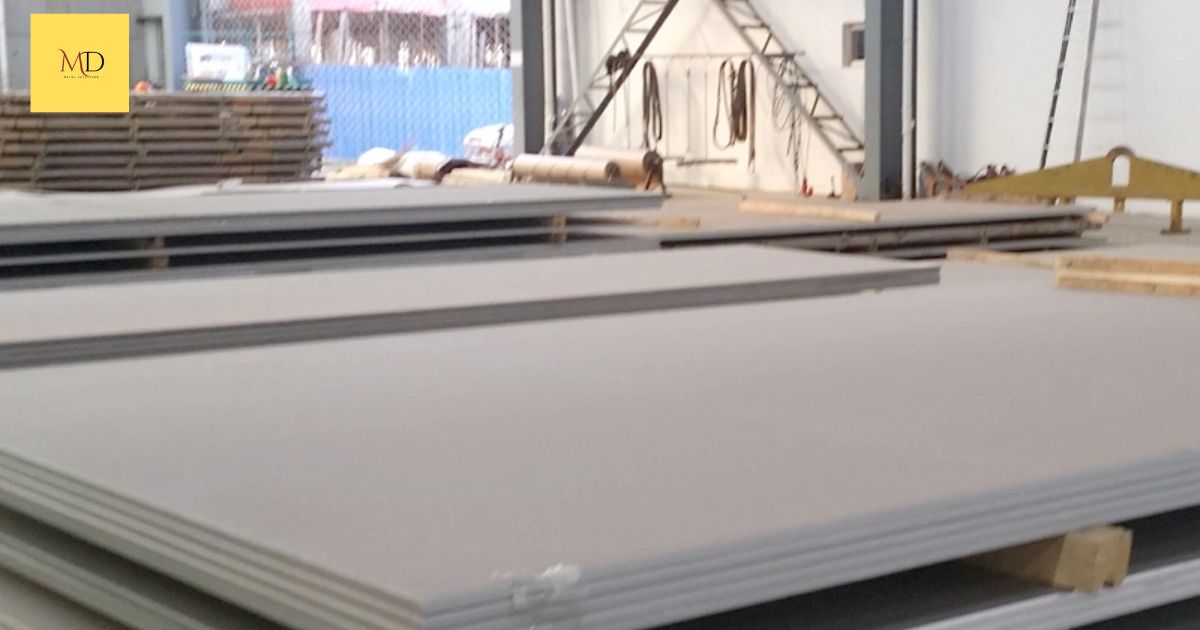Metal detectors are electronic devices that detect the presence of metallic objects. They emit electromagnetic fields and analyze the signals reflected off objects to identify metal. They are commonly used for security screening in airports and events, as well as in treasure hunting and archaeological excavations. Metal detectors help locate and identify metal objects buried in various environments.
Ever wondered if stainless steel can set off metal detectors? It’s a common question for those who’ve passed through airport security or visited high-security venues. The answer might surprise you, and it’s important to know if you’re planning to travel or attend events. Let’s explore the mystery of ‘Does Stainless Steel Set Off Metal Detectors?’ and ensure you’re prepared for a smooth, hassle-free experience.
Stainless steel can sometimes set off metal detectors due to its metallic properties, but it largely depends on the type of stainless steel and the sensitivity of the detector. In high-security settings like airports, even small amounts may trigger the alarms, so it’s essential to be aware when passing through security checkpoints.
Stainless Steel and Metal Detectors
Stainless steel’s interaction with metal detectors is a topic of intrigue, especially for those who frequent airport security checkpoints or high-security venues. Stainless steel, known for its durability and corrosion resistance, is indeed a metal, but its response to metal detectors can vary. In general, the ability of stainless steel to trigger a metal detector largely depends on the type of stainless steel and the sensitivity setting of the detector.
The science behind stainless steel and metal detectors revolves around the principles of electromagnetic fields and conductivity. The ability of a metal detector to detect stainless steel lies in its capacity to induce an electromagnetic response from the metal. Stainless steel’s conductivity can influence this response. While it might not be as conductive as other metals like copper or aluminum, it can still trigger a detector’s alarm when present in sufficient quantities.
Stainless Steel at Airports
Stainless steel plays a significant role at airports when it comes to security screening. In airport security, metal detectors are the frontline defense against potential threats, and stainless steel can trigger these detectors. This is primarily because stainless steel contains metallic properties, which makes it responsive to the electromagnetic fields generated by metal detectors. As travelers pass through security checkpoints, items like stainless steel jewelry, belt buckles, or even eyeglass frames may set off alarms, leading to additional scrutiny by security personnel.
To ensure a smooth and hassle-free experience at airports, it’s advisable for passengers to be aware of the potential impact of stainless steel on metal detectors. Travelers can take proactive steps like removing stainless steel accessories and placing them in a bin for screening separately. By understanding how stainless steel behaves in airport security settings, passengers can expedite the screening process, avoid unnecessary delays, and contribute to the overall efficiency of airport security measures.
Stainless Steel in Everyday Life
Stainless steel plays a significant role in everyday life, and its versatility is evident across various domains. In the realm of fashion and accessories, stainless steel jewelry has become a popular choice due to its durability and resistance to tarnishing. It adorns wrists, necks, and fingers, offering a sleek and contemporary appearance. Beyond personal adornments, stainless steel is a common material in the clothing industry. From belt buckles and buttons to zippers and rivets.
In the kitchen, stainless steel is a go-to material for cookware and appliances. Pots, pans, and cutlery are often made from this metal due to its resistance to staining, rust, and corrosion. Furthermore, stainless steel appliances, like refrigerators and ovens, add a touch of sophistication to modern kitchens while being easy to clean and maintain. Its presence in the heart of the home highlights stainless steel’s prominence in everyday life, where its blend of form and function makes it a preferred choice for many.
The Science Behind Detection

The science behind metal detection is quite fascinating. Metal detectors work on the principle of electromagnetic fields. When you pass through a metal detector, it emits a low-frequency electromagnetic field. Metals, including stainless steel, have the unique property of conducting electricity, and when they come into contact with this field, they disrupt it. This disruption triggers an alarm, alerting security personnel to the presence of metal on your person.
The conductivity of the metal is a key factor. Stainless steel, depending on its composition, can either be a poor conductor or have some degree of conductivity. This variability means that some stainless steel items may trigger metal detectors, while others won’t. So, the next time you’re wondering if stainless steel can set off metal detectors, remember that it’s all about the unique interaction between electromagnetic fields and the metal’s conductivity, making the science behind detection both intriguing and essential for security.
Other Common Materials
In the world of metal detectors, stainless steel is not the only material that can trigger a response from these devices. Various other metals and substances can also set off metal detectors. Among these, gold and silver are notable examples. These precious metals, due to their conductive properties, can cause alarms to sound in sensitive security screening areas. However, it’s not just about metals; even non-metallic items can sometimes set off metal detectors.
Understanding the materials that can activate metal detectors is crucial, especially when passing through security checkpoints at airports, stadiums, or government buildings. Being aware of these common materials helps individuals prepare and navigate security screening procedures with ease, ensuring a smooth and hassle-free experience. It’s essential to be mindful of the items you’re carrying, whether they’re made of metal or have metal components, to avoid any unexpected delays or inconveniences at security checkpoints.
Other to Consider
In addition to stainless steel, there are various other materials that can affect metal detectors, making it crucial to understand the wide range of items that might set off these security devices. For instance, precious metals like gold and silver, which are also excellent conductors of electricity, may trigger metal detectors. It’s not just metallic items that need attention; non-metallic substances like ceramics, certain plastics, and even dense clothing items can sometimes lead to false alarms.
So, when it comes to passing through metal detectors, it’s not only stainless steel that you should keep an eye on but a variety of materials that might catch the detector’s attention. Being aware of these diverse materials that can potentially interfere with metal detectors is essential, especially when traveling or visiting security-sensitive areas. To avoid unnecessary inconveniences, it’s a good practice to remove jewelry, belts, and other accessories before going through security checkpoints.
The Properties of Stainless Steel
Stainless steel is a remarkable material known for its unique properties. It is highly resistant to corrosion, making it a popular choice in a wide range of applications. This resistance comes from its chromium content, which forms a thin, invisible layer of chromium oxide on the surface of the steel, preventing rust and corrosion. Additionally, stainless steel is incredibly durable and can withstand exposure to extreme temperatures, making it suitable for both hot and cold environments.
Its strength and versatility, coupled with an attractive shiny finish, have made stainless steel a preferred option in various industries, including construction, kitchenware, and even medical equipment. Another notable property of stainless steel is its impressive strength-to-weight ratio. It is a strong material, yet it is relatively lightweight compared to other metals like iron or steel.
Factors That Affect Detection
Factors that affect metal detector detection can vary, influencing their ability to identify stainless steel or other metals. One crucial factor is the type of metal being detected. Metals differ in their electrical conductivity and magnetic properties, impacting how easily they can be sensed by the detector.
Another significant factor is the sensitivity level of the metal detector. Different detectors have various settings that can be adjusted to detect larger or smaller metal objects. In high-security environments like airports, detectors are often set to higher sensitivity to catch even small amounts of metal, while in less stringent settings, such as industrial facilities, a lower sensitivity level may suffice.
FAQ’S
Does metal detector detect stainless steel?
Yes, metal detectors can detect stainless steel, but the detection effectiveness depends on factors like the type of stainless steel and the sensitivity settings of the detector.
Do metal detectors detect stainless steel flasks?
Yes, metal detectors can detect stainless steel flasks, as stainless steel contains metallic properties that are detectable by these devices.
What metals set off metal detectors?
Metals such as iron, steel, copper, aluminum, and lead can set off metal detectors due to their electrical conductivity and magnetic properties.
Conclusion
In conclusion, understanding the interaction between metals and metal detectors is crucial, especially when it comes to items like stainless steel. Factors such as the type of metal and the sensitivity setting of the detector play a significant role in whether a metal will trigger an alarm. While metals like iron and steel are almost certain to set off detectors, stainless steel’s response can vary depending on its composition.
Ultimately, whether stainless steel sets off metal detectors or not, it’s always a good practice to cooperate with security personnel, remove any accessories or items that might trigger alarms, and follow their instructions to maintain the safety and efficiency of these security systems. Staying aware of these factors and adopting a proactive approach can make security screenings a hassle-free process for everyone involved.











